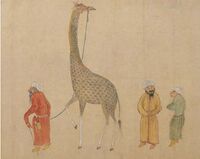Alawokambese Thalassocratic Period
The Alawokambese Thalassocratic Period (789-1192) was a period during the middle ages marked by the total naval domination of Isuan by Alawese and Kambese city-states. Coming at the crepuscule of the Gao Dynasty's rule in Huran, the Alawokambese Thalassocratic Period spanned for a period of roughly 400 years until the emergent Kuang Dynasty defeated the last Alawokambese settlements on Mainland Isuan. Despite the end of unquestioned Alawokambese hegemony in the region, sailors from modern day Selajung would continue to play a central role in trade in the region up until the colonial period.
United at first under the rule of King Daeng Mariok, the city-states of the Alawokambese cultural milieu were able to take swathes of territory in Insular Isuan, granting them access to larger manpower than had previously been accessible. Upon Mariok's death, the city states began to squabble between themselves but soon realised that the possibilities for profit abroad were more beneficial than fighting over the limited domestic labour markets. Macakkanism, which emerged during the early stages of this period of increased prosperity, was spread wherever the Alawokambese settled. The Alawokambese were aided by their advanced shipbuilding and skilful navigation, which permitted them to defeat larger but less well-trained Huranian armies. As Alawokambese navigation was further refined they were able to sail further afield, eventually trading with and even settling in lands as far away as eastern Idica and western Maurceania Major. This led to a period of societal growth and prosperity in Isuan but as this growth became more widespread, especially in Huran, the Alawokambese found it increasingly hard to maintain their hegemony when completely outnumbered. The Kuang Dynasty was able to push the Alawokambese out of Huran, and many of their other dominions were able to expel their foreign rulers by the end of the twelfth century. Despite this, the Alawokambese fleets remained important in trade and much of their cultural legacy was maintained though loose ties.
Historical background
Historic Overview
Trade, raids and settlement
Isuan

ALL YOUR COAST ARE BELONG TO US
- Strongest lasting impacts and longest time there
- Often ruled directly in coastal areas and then through proxies in the hinterlands
Idica

- Trading relations with Okimili
Maurceania
- Trade with coastal peoples, introduction of Macakkanism and tech like crossbows.
- Surprised Auressians who thought it was just rumours

